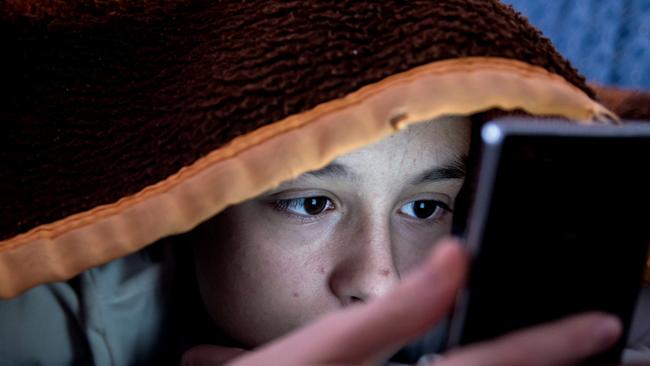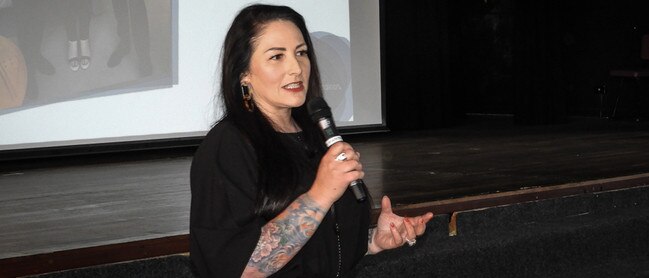Internet predators use COVID-19 lockdown to contact kids for sex
Growing numbers of children are falling victim to online sex abuse, as predators seize on the captive audience of kids relying on the internet during lockdown. Here’s how to keep your family safe.
Coronavirus
Don't miss out on the headlines from Coronavirus. Followed categories will be added to My News.
Growing numbers of children and young people are falling victim to online sex abuse and exploitation, as predators seize on the captive audience of kids relying on the internet for education and socialisation during the COVID-19 lockdown.
In the past fortnight, Australia’s Commissioner for eSafety, Julie Inman Grant, said her office has seen a steep increase in the reporting of online sexual offences against children.
“We’re starting to see a spike over the past two weeks in both child sex abuse material and image-based abuse,” said Ms Inman Grant.
“But before COVID-19 started happening, both law enforcement and e-Safety saw a really sharp increase in what we call coerced, self-produced child sexual abuse material.”

The term refers to children sharing explicit ‘selfie’ images or live-streaming themselves performing sexual acts after being manipulated to do so by an abuser.
“This might happen with very young, unsupervised (kids) on dating sites, or meeting strangers that are using impostor accounts pretending they are young. Other times, they are being targeted and groomed on sites like Tik Tok or YouTube of Instagram. Anywhere children congregate, paedophiles will soon follow,” said Inman Grant.
“It’s really about parents being mindful. We think that our children are safe under our own rooves. But if they’re in the bedroom behind closed doors with devices ¬¬ I know a lot of parents who are catching their very young teenage girls in the middle of the night, putting on makeup and going to the bathroom to make Tik Toks.”

Ms Inman Grant urged parents to use their time at home with kids to have candid conversations about how to stay safe from abuse both on and offline. While the majority of child sex abuse is perpetrated by a person known to the victim, eSafety’s research shows one in four young people in Australia have been contacted by someone they don’t know online.
This can also lead to contact offences, with analysis of chat logs by Middlesex University (London) showing it can take just 18 minutes for some predators to arrange a meeting.

Sonya Ryan runs the Carly Ryan Foundation, in memory of her teenage daughter who was murdered in 2007 by paedophile Garry Newman.
Over a period of 18 months, 15-year-old South Australian schoolgirl Carly spoke with Newman as he masqueraded online as an 18-year-old musician called Brandon, until he was finally able to lure the schoolgirl to her death.
Ryan has since devoted her life to educating kids and providing resources for parents to keep their kids safe on the net.

She too has seen an increase in contact over the past weeks, predominantly from parents concerned about keeping kids safe under the increased internet use necessitated by COVID-19.
MORE NEWS
Doctors look to solve ventilator dilemma
Health chief’s shock reaction to China virus question
The COVID-19 heroes holding Australia together
“These platforms were created for connection and communication but just as something great is created, a criminal will look at it to see how it can be used to exploit the community.
“Take Snapchat, Snapmaps was created so people could look up and know where their friends were but then it started to be used for something more sinister,” said Ryan, referencing a Queensland case in which a victim was offended against as the perpetrator used the app to source location.

“What I really want parents to know and understand is that when they hand over that device to their child, they’ve got to imagine their child is alone behind that screen, and they’ve got to navigate and manage a never-ending amount of content, a borderless environment and an anonymous environment filled with good people and not so great people that are looking to take advantage of that child’s innocence and their openness and willingness to share their information.”
For practical information on how to keep children safe online or to report abuse, visit the Office of the eSafety Commissioner www.esafety.gov.au
Resources and support can also be found at The Carly Ryan Foundation www.carlyryanfoundation.com
TIPS TO KEEP KIDS SAFE ONLINE
* Talk to your kids about online safety (the eSafety website has a guide about talking to your kids about tricky subjects, such as pornography)
* Set boundaries around when and where they can use computers, tablets and gaming consoles
*Use parental controls for help block your child from accessing specific websites, apps or functions
* Make sure their accounts are private and encourage them to delete requests from strangers
* Check smart toys to make sure location settings are off and use strong passwords. Even something as innocent looking as a smart teddy bear can give away your child’s location
